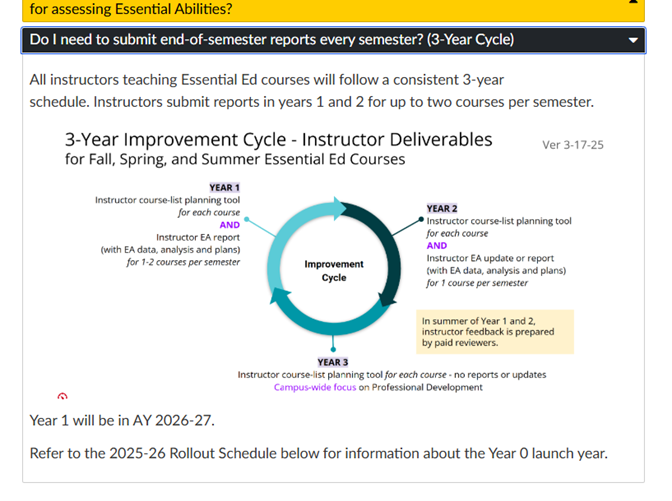As noted in the October Tech Today article and the October 15 Essential Ed Newsblog, faculty support Michigan Tech’s Essential Education continuous improvement process by completing Planning Tools at the start of each semester and EA Reporting at the end, following a three-year cycle.
Why This Matters
By reflecting on and refining how their courses support the Essential Abilities, instructors help students engage with a clearer, more intentional course design. This reflection promotes deeper learning and helps students develop and demonstrate the skills essential for academic achievement and career success.
Submitted EA Reports are peer reviewed, allowing colleagues to share constructive feedback and identify trends that inform broader program improvements.
Planning Tool Updates
Thank you to all who are contributing to the rollout of Essential Education courses this year!
From faculty Planning Tool submissions, the Essential Education Course List Teams and Steering Committee responded to instructor requests for support and acted on suggestions to improve processes and available resources.
Instructors teaching in Spring 2026 will notice several updates already incorporated into the new Planning Tools.
Instructor EA Reporting – Soft Launch Expansion
The soft launch for Instructor Essential Abilities (EA) Reporting began last spring with a small number of courses and has now expanded to include three course lists this academic year: Foundations and lower-level Math and Science courses.
Feedback from this phase will guide refinements to both the process and support materials in preparation for the full launch of instructor reporting for all course lists in AY 2026–27, which marks the start of the full Essential Education three-year continuous improvement cycle.
Soft Launch Instructions for Fall 2025 Instructors
Faculty teaching Fall 2025 Essential Education Foundations or lower-level Math and Science courses received an email on October 25 with submission instructions.
When ready to report, instructors should:
- Upload their completed EA Report Template and two student work samples using the Submit Form.
- Use the Instructor EA Reporting Guide (Canvas) with step-by-step instructions and FAQs to assist with submission.
If there are multiple sections of the course (the same or multiple semesters), contact essentialed@mtu.edu for assistance.
Important Dates for Instructors
Fall 2025 Courses
- Monday, August 25 – Planning Tools due (all Essential Ed courses)
- Friday, January 16 – Instructor EA Reports due (Foundations and lower-level Math/Science only)
Spring 2026 Courses
- Monday, January 5 – Planning Tools due (all Essential Ed courses)
- Wednesday, April 29 – Instructor EA Reports due (Foundations and lower-level Math/Science only)
Summer 2026 Courses
- Planning Tools due the first day of instruction
- Instructor EA Reports due three days after the final exam period (Foundations and lower-level Math/Science only)
Support and Resources
Workshops are being scheduled upon request, and office-hour sign-ups will be available later in the semester.
For assistance, please contact:
- Essential Ed Steering Committee and Course List Team Members in your unit
- The Essential Ed support: essentialed@mtu.edu
- EA Reporting: Jeannie DeClerck, Assessment Manager
- HuskyFolio Support: AJ Hamlin, Director of Husky Folio
Thank you for your continued commitment to the Essential Education program. Your time, reflection, and participation are vital to strengthening our courses, supporting student learning, and sustaining meaningful program improvement.
